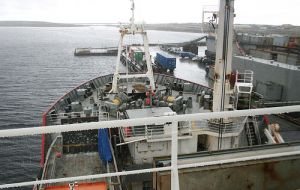MercoPress. South Atlantic News Agency
Oil race fuels new Falklands chapter
 ”The war completely changed the Falklands from an economic perspective,” said Mike Summers
”The war completely changed the Falklands from an economic perspective,” said Mike Summers  The pressure from Argentina has escalated into an “economic blockade”
The pressure from Argentina has escalated into an “economic blockade”  “It’s sort of an operatic experience living next to Argentina,” says Stuart Wallace
“It’s sort of an operatic experience living next to Argentina,” says Stuart Wallace The following article from the Sydney Morning Herald was written by Chris Zappone, who recently visited the Falkland Islands as a guest of the local government and the Foreign Office.The Falkland Islands are not an easy place to reach. Flights come only weekly. Cruise ships making the trip brave frigid seas, freezing nights and recently, harassment from Argentine dockworkers.
When cruisers drop anchor outside Stanley Harbour, if the water is too choppy, the tenders from the ships can’t bring passengers ashore. Passengers then see the barren hills of the islands only through their cabin windows.
This may change if oil exploration in the undersea waters around the Islands develops into an industry. Not only could a port be built to allow tourists to disembark in any weather, but more goods could come to the Islands, ending the frequent shortages.
Everything, in fact, would change for these windswept islands, including the calculus around the Falklands' self-determination.
“It really is about long-term economic security,” explains Stephen Luxton, the Director of mineral resources for the Falkland Islands government, who boasts a family history on the Islands going back 150 years. “It’s about ensuring we can carry on looking after the interests of the Falklands and being self-sufficient and maintaining our self government . . . which is very important to us.”
While the people of the Falklands welcome the progress that could come with oil, Argentina, which invaded the islands 32 years ago this month, is less than enthused. The South American nation has cranked up diplomatic pressure on the Falklands, focusing not just on the British, who handle the territory's defence and foreign policy, but on any companies doing oil business with the islands.
Argentine President Cristina Fernandez this year created a Secretariat of the Malvinas (the Spanish name for the Falklands) to pursue Argentina’s “rights and interests” around the Islands.
”Never before in Argentina's history has this matter, a question of territorial integrity, occupied such an important place in a government,” Argentine Foreign Minister Hector Timerman said.
One only has to look at the Falklands to see what sort of difference the industry could make to its people. The Islands have an almost otherworldly beauty owing to a lack of trees and farmland. The harbours showcase more than one wrecked or scuttled ship – a reminder of the harsh maritime environment. Most roads outside of the capital Stanley are unpaved.
Any living eked out in this place is remarkable. So it’s little wonder hopes around an oil industry are high.
Even before pumping - expected to begin in 2019 - starts, companies in neighbouring countries will begin to work more visibly with the Falklands Islands, says Hamish Wylie, general manager of the fisheries provision company Seafish Falklands. And that, Wylie suspects, is what Argentina must be dreading.
“Whilst at the top, the president of Chile and the president of Uruguay might say they support Argentina’s claim on the Falklands, once you get beneath that there will be no evidence of it at all . . . That will be embarrassing for Argentina.”
Things weren’t always this prickly. Less than a decade ago, cooperation between Argentina and the Falklands on fisheries was common.
But first, a little background.
In 1982, Argentina, under military dictator Leopoldo Galtieri, invaded the Islands it has claimed for decades. Britain, as a matter of principle and Thatcher-era pride, assembled a naval task force and set sail to reclaim the Islands by force. The British victory that ensued was one of the most decisive of modern history.
The aftermath of the conflict was actually pretty good for the Falklands.
A 241-kilometre security zone declared by Britain around the Islands during the war became a fisheries conservation and management zone. Commercial fishing licences were sold, businesses created and revenue flowed in. GDP grew from £5 million in 1980, to about £130 million (241 million in unadjusted dollars) in 2010. Land ownership was reformed, giving the Islanders control of the wool farms. Soon roads were paved and the Falkland Islands government began investing in education.
“The war completely changed the Falklands from an economic perspective,” said Mike Summers, a member of the Falkland Islands' legislative assembly. “It saved us, as a country, if you like.”
In 1990, the British and Argentine governments resumed relations and for years Argentina and the Falkland Islands cooperated in ocean research and fisheries monitoring. They signed a joint declaration for the development of undersea oil in 1995. But almost immediately, Argentina protested the handling of oil exploration by the Falklands and Britain.
In 2000, Argentina and Britain agreed to spell out their differences with the aim of resolution. By 2007, around the time Mrs Cristina Fernandez de Kirchner was elected president, her government abandoned the prospect of mediation over resources.
Since then, the pace of statements, declarations and accusations from Argentina has only increased.
As Argentina sees it, Britain should return the Islands under the United Nations-supported decolonisation process. Britain will negotiate only if the Islanders have a seat at the table and their right to self-determination (also supported by the UN) is respected.
And so, after threatening to cut off the single weekly commercial flight from Chile because it passes through Argentine airspace in 2012, Argentina made it a criminal offence to support the Falklands oil industry. The 2013 referendum, showing that 99.8% of Falkland Islanders wish to remain linked to Britain, was dismissed by Argentina as a “publicity stunt“.
The pressure from Argentina has escalated into an “economic blockade”, says Falklands acting governor Sandra Tyler-Haywood.
She sees the creation of the Malvinas Secretariat as a response to the Falklands’ progress in developing oil. “As we get closer to what may be the first barrel of oil produced, the Argentines have a determination,” she says. “Obviously, if you get to first production, well, that’s ‘game over’ in trying to prevent people taking part.”
Given the state of the global economy, no government will want to turn away business from the Falklands.
Britain has administered the Islands since 1833 (except for the 1982 war) and has claimed them since 1765. Argentina's claim hinges on whether it inherited the lands from Spain upon Argentina's independence in 1810.
Being so remote, continuous occupation was difficult for any power and history was largely content to leave the Falkland Islands alone. When history does come, though, it often comes heavily armed. Not just during the 1982 conflict, but also during a crucial sea battle between the British and Germans in World War I. Few Islanders today expect a rerun of the 1982 invasion as Argentina’s government is explicitly anti-militarist these days.
Nevertheless, Argentina’s political and economic wobbles are a source of worry.
“It’s sort of an operatic experience living next to Argentina,” says Stuart Wallace. “You could sell tickets to it.”
Wallace, a soft-spoken man with an impish smile, runs a successful fishing company, Fortuna, founded after the war. “The instability in Argentina reminds me of the days before the conflict,” says Wallace, who has memories of being taken at gunpoint onto an Argentine helicopter in 1982.
But Wallace is quick to point out that there are two major differences today. Now the Islands enjoy the explicit support of Britain, he says, and the Islanders themselves are better off and better educated. They are also more confident. And with a viable oil industry on the horizon, the expectation is that that confidence will grow.




Top Comments
Disclaimer & comment rules-

-

-

Read all commentsEither the journalist did not fully understand the situation or something has been lost in the wording:
Apr 12th, 2014 - 09:48 am 0”As Argentina sees it, Britain should return the Islands under the United Nations-supported decolonisation process. Britain will negotiate only if the Islanders have a seat at the table and their right to self-determination (also supported by the UN) is respected.”
The second quoted sentence is wrong- the UK has said repeatedly it will negotiate sovereignty only if the the Falkland Islanders themselves actually want this (which in practical terms means not any time in the forseeable future). The UK did not say“we will negotiate sovereignty if the islanders are represented and their right to self determination is respected” as the article states, or at least implies. That would be a contradiction in itself.
Its also shaky to say that “Britain has administered the islands since 1833”. That depends on your definition of 'administer'. One does not have to be physically present on property you own the entire time you own it to 'administer it'.
As an Australian I am a bit disappointed in this kind of loose language coming from the Sydney Morning Herald, which is generally seen as a quality and balanced publication.
Though well intentioned, no doubt in his belief he should put forward a balanced report, it is clear he actually doesn't completely understand the situation at all. It is very similar to a lot of foreign journalism on the subject, if they had lost over 250 soldiers, they would probably ensure that get the details correct in their journalism.
Apr 12th, 2014 - 10:16 am 0In my opinion the writer has made the errors pointed out above. These are not that serious in my opinion but errors never the less.
Apr 12th, 2014 - 10:55 am 0Th important omission is that the decolinisation supported by the UN is in the 'hands' of the 'inhabitants' of the territory concerned. Article 73 of the UN Charter refers. The relevant part of which reads:
“Members of the United Nations which have or assume responsibilities for the administration of territories whose peoples have not yet attained a full measure of self-government recognize the principle that the interests of the inhabitants of these territories are paramount, and accept as a sacred trust the obligation to promote to the utmost, within the system of international peace and security established by the present Charter, the well-being of the inhabitants of these territories, and, to this end:
”Members of the United Nations which have or assume responsibilities for the administration of territories whose peoples have not yet attained a full measure of self-government recognize the principle that the interests of the inhabitants of these territories are paramount, and accept as a sacred trust the obligation to promote to the utmost, within the system of international peace and security established by the present Charter, the well-being of the inhabitants of these territories, and, to this end:”
Please note 3 very important words in that extract, 'interests', 'inhabitants' and 'paramount'.
Further the ICJ has said 5 times that because of Chapter XI of the UN Charter, which contains Article 73, ALL (my emphasis) None-Self-Governing Territories (NSGT's) have the right to self-determination.
Game over for Argentina but they keep trying to introduce limitations to that right but so far neither the UNGA nor the ICJ have done so.
Commenting for this story is now closed.
If you have a Facebook account, become a fan and comment on our Facebook Page!